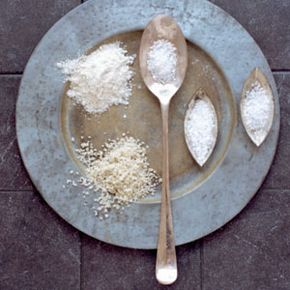 “A smattering of salts — from table salt to sea salt — shows just how beautiful and glorious this ancient seasoning is. See more salt pictures.Creatas Images/Thinkstock
“A smattering of salts — from table salt to sea salt — shows just how beautiful and glorious this ancient seasoning is. See more salt pictures.Creatas Images/Thinkstock
The next time you’re tempted to skip fixing a fresh meal in favor of serving a canned one, think again. Canned soups and veggies, along with condiments and prepared mixes (like muffin mix) are among the worst offenders out there in terms of sodium content. Whether its function in a particular food is to add flavor, act as a preservative or bind ingredients, sodium is lurking in a lot of your favorite edibles — and too much of it is right up there with saturated fats and calories on the bad-for-you scale.
So, how much is too much? Sodium is naturally present in most foods in small amounts. In fact, we actually require a little bit of sodium as part of a balanced daily diet to help our bodies transmit nerve impulses, keep fluids in balance and maintain muscle health.
Unfortunately for unwitting sodium consumers, many food manufacturers add much more sodium to their products than we really need to get by. As a result, a frightening 75 percent of our daily intake comes from sodium added to processed foods, rather than natural sources, according to the American Heart Association.
Experts advise that certain risk groups, such as people with high blood pressure, diabetes or kidney disease, consume no more than 1,500 milligrams of sodium every day. African-Americans and those of middle age should also limit their intake, but other healthy adults can safely consume around 2,300 milligrams a day, according to The Mayo Clinic.
Here’s a reality check for those of you who think there’s no way that you consume that much sodium: Most Americans put away a disturbing 3,436 milligrams per day. If you’re just starting to learn more about nutrition, it might seem nearly impossible to stay on the track to healthy eating. From sugars and carbs to all variety of fats, it often seems like our only options are fresh fruits and veggies.
Why add sodium to the ever-expanding list of things to monitor in your diet? The reason is both simple and unnerving: Excessive sodium consumption is linked to high blood pressure, which plays a major role in the development of such heavy-hitting health problems as heart disease, kidney disease, stroke or congestive heart failure. Chew on that the next time you dump a teaspoon of salt on your already salted pasta.
Limiting sodium intake doesn’t have to be as daunting as it seems. Some recipes call for salt, but don’t really need it, so you might try leaving it out or reducing the amount. Also, you can measure out only a teaspoon or two of sodium-rich condiments like ketchup, rather than smothering all of your french fries in it. The next time you’re in the mood for muffins, take a few extra minutes to make them from scratch, since processed foods and baking mixes contain significant amounts of sodium. It’s also surprisingly easy to check labels for sodium content, as levels may vary widely among brands. Be sure to steer clear of products with more than 200 milligrams per single serving. Many food products make it easier to pinpoint sodium levels with helpful labels like "salt-free" or "sodium-free." Beware of labels that claim "light" or "reduced" sodium; these foods may have low levels of sodium, but high amounts of salt.
Chances are that simply being aware of this often overlooked substance can help you make the reductions you need to be as healthy as possible. In fact, many former salt and sodium junkies admit that a couple of weeks of low-sodium living is all it takes to adjust for the long haul!
Lots More Information
Related Articles
- Is "fresh" always healthier?
- 5 Low-sodium Cheeses
- 5 Tips for Sticking to a Low-sodium Diet at Dinner
- How Salt Works
- Food Fillers 101
- What keeps longer, canned or boxed food?
- Everything You Ever Wanted to Know About Canned Food
Sources
- Mayo Clinic Staff. "Sodium: How to Tame Your Salt Habit Now." Mayo Clinic. May 22, 2010. (Nov. 16, 2010). http://www.mayoclinic.com/health/sodium/NU00284
- "Sodium (Salt or Sodium Chloride)." American Heart Association. 2010. (Nov. 16, 2010). http://www.americanheart.org/presenter.jhtml?identifier=4708




























